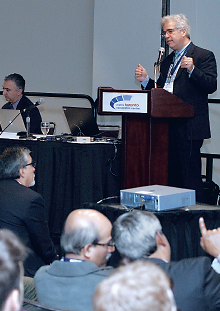Lithium Remains a Viable Option for People With Bipolar Disorder
Abstract
Despite studies demonstrating the effectiveness of lithium for the treatment of bipolar disorder, its use in clinical practice in the United States is declining, experts say.
“Who here has heard of lithium?” asked Michael Ostacher, M.D., an associate professor of psychiatry at Stanford University School of Medicine, during a session at APA’s 2015 annual meeting in May on treating bipolar disorder.

Michael Ostacher, M.D., believes that it’s important to continue research on all treatments for bipolar disorder, even treatments that are less utilized such as lithium.
Ostacher deemed the question—which was followed by a light chuckle from the audience—as relevant because though the drug has been a well-established treatment for bipolar disorder for 45 years, its use, at least in the United States, is declining.
“This decline [in lithium prescribing] is understandable,” said Ostacher, who explained to session attendees that the underutilization of the drug may be partly attributed to the marketing surge for other FDA-approved drugs for the treatment of bipolar disorder.
According to Ostacher, previous research from insurance databases in the United States suggests antidepressants—initiated at diagnosis and continually used one year after diagnosis—are the most commonly prescribed therapy for bipolar disorder. This research shows that 70 percent of individuals diagnosed with bipolar disorder have been prescribed antidepressants compared with roughly 12 percent who have been prescribed lithium.
During his talk, Ostacher presented data from his recent work comparing the effectiveness of lithium with that of other medications in the treatment of bipolar disorder, including the results of BALANCE (Bipolar Affective disorder Lithium/Anticonvulsant Evaluation)—a multisite, randomized, open-labeled comparison study with lithium and the anticonvulsive divalproex.
The study, which included 330 adults with bipolar I disorder, showed that the risk of symptom relapse was reduced by 41 percent in patients who took a combined daily dosage of lithium (0.4 mmol) and divalproex (1,250 mg) over a two-year period. The risk of symptom relapse was reduced by 29 percent in patients who took lithium alone and 18 percent in patients who took divalproex alone.
“This primarily said that lithium or lithium in combination with divalproex was more effective than divalproex alone,” said Ostacher. “This totally contradicts the way we initiate treatment for bipolar disorder in our patients in the U.S.”
Ostacher mentioned that one of the limitations of the study was that most of the sample population was on a monotherapy prior to the study, whereas a significant number of people, particularly in the United States, take multiple medications at once.
A study by Andrew Nierenberg, M.D., and colleagues compared the effectiveness of lithium with the antipsychotic quetiapine in 482 patients with bipolar I or bipolar II disorder and at least one comorbid mental health condition. The patients were given a mean dose of 1,008 mg of lithium or a mean dose of 345 mg of quetiapine daily for six months while continuing to take medications for their other mental health conditions.
The researchers tracked changes in the severity of bipolar disorder–related symptoms reported by patients—as measured by the scale of Clinical Global Impression for Bipolar Disorder Efficacy Index (CGI-BP EI)—and how frequently providers altered dosages of the medications due to side effects or lack of efficacy, known as necessary clinical adjustments (NCAs).
The analysis found both lithium and quetiapine to be equally effective in reducing symptom severity related to bipolar I and II disorder in patients at the study end point. However, the lithium group had significantly fewer NCAs per month than the quetiapine group.
After the session, Ostacher told Psychiatric News that “if we learn how to use it properly and safely in patients, lithium can be a mainstay medication for some patients.” He emphasized that it is important for experts in the field to conduct more reliable studies that will provide confident enough results that would increase lithium use in clinical practice.
“There are multiple treatment options available to treat bipolar disorder. We just need to have enough information—on all options—to be able to determine which option is best for our patients,” Ostacher concluded. ■



